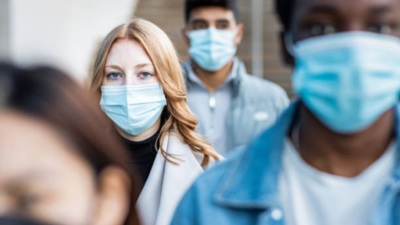ARTICLE AD BOX

So, just when we thought we were done hearing about new COVID variants, another one popped up. This time it’s called NB.1.8.1, and yes, it’s already made its way to the UK. It’s raising some eyebrows among doctors and scientists because it spreads quickly and might sneak past some of our usual defenses, like past infections or vaccines.But before we panic, let’s break it down: what this variant is, how it might feel if you catch it, and what you can do to protect yourself.
So, what exactly is NB.1.8.1?
NB.1.8.1 is a subvariant of Omicron, the version of COVID we've all become a bit too familiar with over the last couple of years. It showed up in early 2025 and, since then, has been spotted in over 20 countries—including the US, several places in Europe, and now the UK.The World Health Organization (WHO) is keeping a close eye on it and has labeled it a “variant under monitoring.”
That basically means it’s not time to panic, but it’s definitely worth watching because it spreads quickly and might be better at dodging the protection we get from vaccines or past infections.
What are the symptoms of NB.1.8.1?
The symptoms so far look pretty similar to previous Omicron variants, but there may be a few slight differences from person to person. Here’s what people are commonly reporting:Fever and chills – One of the first signs that something’s off.
Dry, persistent cough – Not fun, and can stick around for a while.Fatigue – That “I can’t get off the couch” kind of tired.Sore throat – Scratchy, painful, or just uncomfortable.Runny or stuffy nose – Feels like a bad cold.Headaches – These can range from mild to pretty intense.Muscle or body aches – General body pain or soreness.Loss of taste or smell – Still showing up, though less common than with earlier strains.Not everyone gets all of these, and some people might only have mild symptoms—or none at all.
It’s also totally possible to think it’s just a regular cold or allergies.
Who’s at higher risk?
So far, most cases seem to be mild, especially for people who are vaccinated or have had COVID before. But, as always, there are groups who need to be more cautious:Older adults (especially those 65+)People with weakened immune systems (due to illness or medications)Unvaccinated folks, particularly those who haven’t had any booster shotsIf you or someone you know falls into one of these categories, it’s a good idea to keep an extra eye on any symptoms and get medical help if things don’t feel right.
Any new or unusual symptoms?
Besides the usual cold-like signs, a few people with NB.1.8.1 have mentioned some less common symptoms too:Upset stomach – Nausea, vomiting, or diarrheaSkin rashes – Not super common, but it’s happenedDizziness or confusion – Rare, but reported in a few casesIf something feels off—especially if you’re in one of the higher-risk groups—it’s better to get checked out sooner rather than later.
How can you protect yourself?
The usual COVID safety stuff still works here. Nothing fancy—just the basics:Stay up to date on your vaccines and boosters.
They may not completely prevent infection, but they do help your body fight off the virus better.Wear a mask in crowded indoor places, especially if you’re high-risk or around someone who is.Wash your hands regularly with soap and water (or use hand sanitizer if you’re out and about).Keep some distance from people who are coughing or not feeling well. No need to be paranoid, but being smart helps.
What to do if you feel sick
If you start feeling symptoms that could be COVID—whether it’s NB.1.8.1 or not—don’t ignore them. Here’s what to do:Self-isolate as soon as you can.Take a COVID test (rapid tests can help, but PCR is more accurate if you can get one).Let others know if you've been in close contact recently, just in case.Rest up and monitor symptoms—and definitely reach out to a healthcare provider if things get worse.NB.1.8.1 is yet another reminder that COVID hasn’t totally disappeared. But it’s also a sign of how far we’ve come—because now, we know what to look out for, how to handle it, and how to protect ourselves and each other.So, stay informed, stay calm, and take care of yourself. A little caution goes a long way, and you’ll be better prepared if this variant (or the next one) comes your way.



.png)
.png)
.png)
















 15 hours ago
4
15 hours ago
4









 English (US) ·
English (US) ·